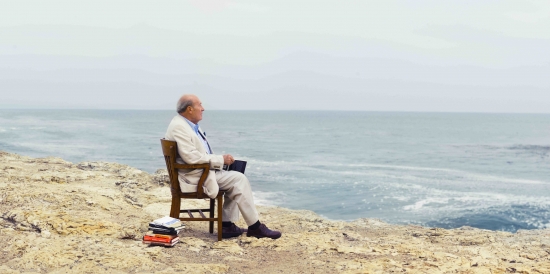 Murray Baumgarten. Photo by Elena Zhukova. Copyright UC Regents198 pages, 2014
Murray Baumgarten. Photo by Elena Zhukova. Copyright UC Regents198 pages, 2014
To read the full text of Murray's Universe: An Oral History with UCSC Professor Murray Baumgarten, 1966-2014 [PDF] (University of California's escholarship platform). Includes complete audio (streaming or download) for the oral history. Note: Due to editing by the narrator and the Project, there may be minor differences between the audio recording and the transcript. Please quote from the transcript as the record and not the audio. Audio will be found under "Supporting Material."
The Regional History Project conducted this oral history with Murray Baumgarten, Distinguished Professor of English & Comparative Literature, as part of its University History Series. Baumgarten arrived at the University of California, Santa Cruz in 1966 as a professor in the literature board and affiliated with Stevenson College. In 2014, as this oral history goes to press, he still teaches full time at UC Santa Cruz, which makes him the longest-serving full-time faculty member on campus.
Baumgarten’s contributions to the development of UCSC are substantial and eclectic. They begin with the initiation of the Strouse Carlyle Collection at the University Library. In 1966, Baumgarten’s keen interest in the nineteenth century writer Thomas Carlyle, on whom he had written his dissertation, persuaded book collector Norman Strouse to gift the UCSC Library with his personal collection of rare and unusual materials by and about Carlyle. While collaborating with other scholars on the literary study of Carlyle in the late 1960s, Baumgarten made innovative use of what was then brand-new mainframe computer technology in order to compare different versions of the same Carlyle text. He later served as the founding editor-in-chief of the University of California Press’s Carlyle Critical Edition. From his early adoption of computer technology to study both Thomas Carlyle and Charles Dickens, to his recent online course on Coursera, Baumgarten has pioneered the digital humanities.
In the early years of the campus, Baumgarten also was the first chair of UCSC’s (and now dissolved) Modern Society and Social Thought major offered through Stevenson College. Modern Society and Social Thought eventually provided the first home for Baumgarten’s groundbreaking course Holocaust: The Destruction of European Jewry, one of the first college courses on the Holocaust on any college campus, now offered online through Coursera as the campus’s first MOOC [Massive Open Online Course]. Baumgarten continues to be a leader in the field of Jewish studies at UCSC and beyond. In 1999 he founded the Jewish Studies program and undergraduate minor and major at UCSC, endowed by the Helen and Sanford Diller Family Endowment for Jewish Studies. He still co-directs this program with Nathaniel Deutsch. From 1994 to 2006 he edited Judaism: A Journal of Jewish Life and Thought, published by the American Jewish Congress. In 2009 he created the Venice Center for International Jewish Studies. Baumgarten’s visionary legacy is now honored by the Baumgarten Endowed Chair for Jewish Studies.
The other most visible part of Baumgarten’s career centers on Charles Dickens. In 1981, he and his colleagues, John Jordan, and Ed Eigner, a professor at UC Riverside, founded The Dickens Project, a Multicampus Research Unit, which was the first UC-wide humanities initiative. Perhaps the most popular component of the Dickens Project is the Dickens Universe, a kind of summer conference or summer camp for scholars, teachers, students, and readers with a passion for the works of Charles Dickens. This is one of the very few literary conferences which crosses the borders between the academy and the community.

 Santa Cruz, CA
Santa Cruz, CA



